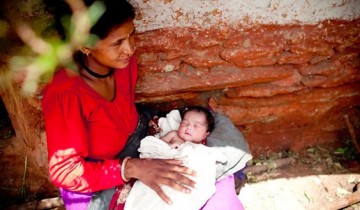The University of British Columbia has received a $7 million grant from the Bill & Melinda Gates Foundation. UBC researchers working at the Child & Family Research Institute will test new strategies for the monitoring, prevention, and treatment of pre-eclampsia.
Hypertensive disorders, or high blood pressure, complicate five to 10 percent of pregnancies and can lead to serious maternal and fetal illness or death. Pre-eclampsia, the most serious of these disorders, is the second leading cause of maternal death worldwide, resulting in up to 76,000 maternal deaths each year.
“That translates into the death of one mother every seven minutes, and 99 per cent of these deaths occur in lower- and middle-income countries,” says Dr. Peter von Dadelszen, an associate professor of Obstetrics and Gynaecology in UBC’s Faculty of Medicine and co-director of the Reproduction & Healthy Pregnancy research cluster at CFRI.
The World Health Organization (WHO) estimates that more than 500,000 fetuses and newborns die annually due to pre-eclampsia. The only way to cure pre-eclampsia is to deliver the placenta and infant. Pre-eclampsia-related maternal deaths primarily result from delays in diagnosis, transport and treatment.
The $7-million grant from the Gates Foundation will support a four-year international research and community-level intervention project called PRE-eclampsia-Eclampsia Monitoring, Prevention and Treatment (PRE-EMPT).
Led by Dr. von Dadelszen, the team, consisting of UBC Nursing Adjunct Professor Diane Sawchuck and researchers, physicians and community health professionals from Canada, the U.S., Africa, Asia, Oceania, the U.K. and the WHO, will study, develop and implement a set of clinical guidelines tailored for lower- and middle-income countries. The underlying cause and potential new community-based treatments for pre-eclampsia will also be investigated.
“Many women in low- and middle-income countries deliver their babies at home and many live far away from medical facilities equipped to treat pre-eclampsia,” says Dr von Dadelszen, who developed a model for predicting pre-eclampsia, which is now part of the Neglected Global Disease Initiative at UBC.
“Establishing and implementing diagnosis and triage guidelines and implementing effective interventions across various levels of community health professionals and caregivers can help them accurately assess the severity of the disorder and provide necessary treatment in a timely manner.”
The PRE-eclampsia-Eclampsia Monitoring, Prevention and Treatment (PRE-EMPT) Project
The Bill and Melinda Foundation-funded PRE-EMPT Project consists of five interrelated components.
One component of the study is a clinical trial of pre-pregnancy and early pregnancy calcium supplementation in women with low calcium intake and at high risk for pre-eclampsia in their next pregnancy. The goal of this South African and Zimbabwean trial is to determine whether or not pre- and early-pregnancy calcium supplementation prevents both the diagnosis and consequences of pre-eclampsia.
Another component aims to develop and validate tools to better identify, diagnose, and assess risks in order to accelerate triage and transport to centres where women will receive effective and evidence-based treatment. This effective care will avert the adverse maternal and perinatal consequences of pre-eclampsia.
A third component will test the impact of a community-level care program for reducing adverse maternal and perinatal outcomes related to pre-eclampsia. This program will be tailored to different levels of care in a total of four South Asian and sub-Saharan countries.
The fourth component of the project is the establishment of an international collaboration to share clinical data and carefully collected biological samples for further collaborative studies that facilitate new knowledge generation.
Finally, a knowledge translation group will update the relevant WHO guidelines.
-30-
The UBC Faculty of Medicine provides innovative education programs in health and life sciences, teaching over 3,000 students at the undergraduate, graduate and postgraduate levels. In addition, over 700 researchers/faculty members representing all of the Faculty’s 19 departments, two schools and 15 research centres and institutes received research grants. In 2008/09 the Faculty generated more than one-half of the total research funding of the university ($475.3M). For more information visit www.med.ubc.ca.
The Child & Family Research Institute (CFRI) works in close partnership with the University of British Columbia and the Centre for Molecular Medicine and Therapeutics; BC Children’s Hospital and Sunny Hill Health Centre for Children, BC Women’s Hospital & Health Centre and BC Mental Health & Addiction Services, agencies of the Provincial Health Services Authority; and BC Children’s Hospital Foundation. CFRI has additional important relationships with British Columbia’s five regional health authorities and with B.C. academic institutions Simon Fraser University, the University of Victoria, the University of Northern British Columbia and the British Columbia Institute of Technology. For more information, visit www.cfri.ca.
The Neglected Global Diseases Initiative at UBC (NGDI-UBC) aims to bring together the technical expertise and perspectives of a variety of disciplines at UBC – including bench science, pharmaceutical and health research, business, social policy, and law – to develop interventions for neglected global diseases and ensure their delivery to those in need. For more information, visit www.ngdi.ubc.ca.
For further information:
Brian Lin
UBC Public Affairs
Tel: 604.822.2234
Cell: 604.818.5685
Email: brian.lin@ubc.ca
Jennifer Kohm
Child & Family Research Institute
Tel: 604.875.2401
Email: jkohm@cw.bc.ca

